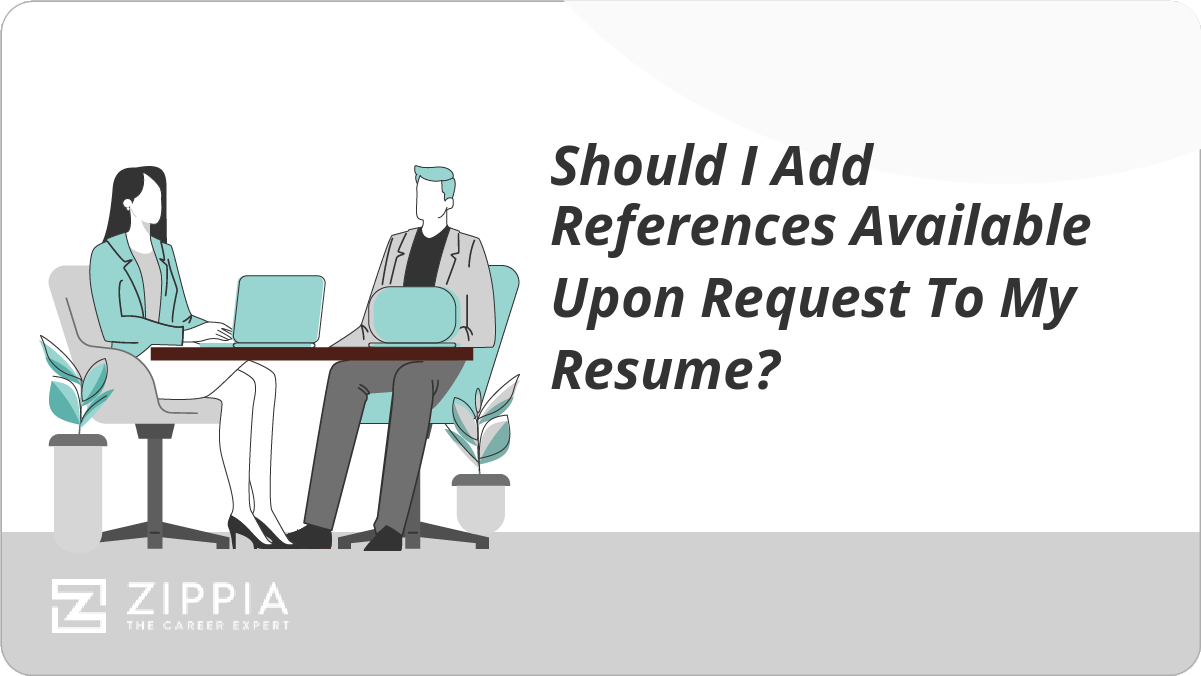- Application
- Email Communication
- Letter Communication
- Follow Up
- Job Application Tips
- About Me Page
- Answering Machine Messages
- What To Bring To A Job Fair
- Free Job Posting Sites
- Email Sign Offs
- Job Scams
- How Long Does It Take To Become A Doctor
- How Long Does It Take To Become A Vet
- Government Programs That Help Felons Get Jobs
- How Long Does It Take To Become A Dentist
- Relocation
- Job Search Spreadsheet
- Right To Work States
- How To Research A Company
- How To Change Careers
- What To Do If You Have No References
- Working For a Big Company Vs. A Small Company
- Writing Sample Format
- How Long Should A Writing Sample Be
- How To Get A Job Fast
- How Many Jobs Should I Apply For
- Military Requirements
Find a Job You Really Want In
In most cases, you don’t want to put “references available on request” on your resume as it is generally considered outdated. In this article, we’ll look deeper into what belongs on a resume and why you want to leave the standard references line out.
We’ll also look at the reasons you might want to include it. Yes, it’s possible that including a line about references is good for you, and that you’ll want it on your resume.
Key Takeaways:
-
Including references available on request on your resume is almost always unnecessary and takes up valuable resume space.
-
There are rare cases where you may want to include references available upon request on your resume, like if your resume contains no work experience or if your references include well-known individuals.
-
You should also exclude things such as salary information and personal details from your resume.

Reasons to Exclude References Available Upon Request
For the majority of people, the possible reasons to include mentions of references on their resume are far outweighed by the many reasons not to:
-
Outdated. Having any mention of references in a resume looks outdated and out of touch.
-
Too long. The standard wisdom is that the length of your resume should be one page. There are exceptions. But if you’re struggling to keep it down to a single page of great reasons to hire you, then this irrelevant line is wasted space that could be better used to sing your praises.
-
Irrelevant. As we said, it’s irrelevant. Employers know that applicants will provide them with references. Applicants know they should have at least three back pocket references they can go to at a moment’s notice.
-
Weak closing. It’s the last thing on your resume. Is this really how you want to leave them – with a weak line? Sell them with your superior skills instead.
-
Extra step. Some automated resume job application forms ask you to give them references. If you don’t do this and tell them that you’ll provide references upon request, you’ve just made the hiring manager jump through an extra, unnecessary hoop.
-
Better options. There are better ways to connect your next job with your references these days. For instance, keeping an up-to-date LinkedIn profile with referrals and recommendations is easier for everyone. Or having a website with testimonials can totally wow the person in charge of hiring at your dream job. Use technology to your advantage and skip the old-fashioned cliches.
What Does References Available Upon Request Mean?
If you’ve never sent out a resume before, then the phrase, “references available upon request” might be unfamiliar to you. It’s an old resume practice. In fact, a few decades ago, it was basically a required part of your resume.
Reaching back, even before that, people used to list their resume references on a separate sheet and include that with their resume. Eventually, long resumes were shortened, and the goal for most professionals was a one-page resume.
When people dropped the entire page of references and the related contact information, they opted to include the line, “references available upon request” at the bottom of their one-page resume. This let potential employers know that you did indeed have references, and you’d be happy to supply their names and contact information if asked.
But even that was a long, long time ago. It became so standard and ubiquitous to have that line at the bottom of a resume that it became superfluous. Employers knew that applicants for a job would provide them with references. If they asked for them and the applicant didn’t or wouldn’t supply them, well then, those applicants’ resumes went right in the trash can.
These days, we’re back to submitting a full separate page of references, but not until a hiring manager asks for it. Some job applications will ask for a list of references alongside your resume and cover letter, but most organizations choose to wait until seriously considering you for a job before asking for your list of references.
Reasons to Include References Available Upon Request on Your Resume
If the notation about having references has become outdated, why would you ever want to include it on your resume? There are a few times when you might want to buck modern convention and include the phrase and even list actual references on your resume.
-
First resume. If you’ve never written a resume before, you’re fresh out of school, and you have no work history, then you’re going to need to pad your resume. While a brief resume is desirable, if you don’t have anything of substance to put on it, you’re going to need references.
-
Impressive references. If you’ve got some of the biggest names in your industry as references, then including them in the resume can call attention to your credentials.
-
Leading hiring managers. By including references on your resume, you’re hand-picking three people you’d like the hiring manager to contact. This can bolster your standing.
-
Requires contact. If you include the line about your references being available upon request, the hiring manager must contact you first. This gives you a heads up that they’re seriously considering you.
It gives you a chance to make a first impression and connect with the job you want. You also now get to let your references know who will be contacting them, and you can stress how important the job is for you.
-
Privacy. This is for situations where the line about making a request is more desirable than including the references and their contact information. Sometimes your references don’t want their personal information sent everywhere. Keeping their information private unless you’re specifically asked about it is essential when dealing with A-list references.
Please note that 99.9% of the job seekers should leave the line “references available upon request” or any variation thereof off of their resume. It looks outdated and does nothing to help you beyond taking up space.
What’s This About a One-Page Resume?
It’s been mentioned a few times: the perfect resume is a one-page synopsis of your professional highlights and qualifications. A resume is designed to be the elevator pitch of you as an employee. Quick and to the point.
It’s critical to note that a resume and a CV or curriculum vitae are not the same things. If your profession or your experience deserves more than one page, then a CV might be the best way for you to highlight your amazing qualifications. But if you’re like most people, then your career achievements can be summed up in one page, with a lot of tweaking. And that one page needs to be a real eye-catching masterpiece of professional success. That is, if you want to get the job.
If this is where you’re headed, down the road to a great resume that lands every job you apply for, then there’s no room for superfluous and outdated sections. Even one line like “references available upon request” takes up valuable real estate. Skip that line and skip all of the following unnecessary information, too.
What Else to Omit from Your Resume
It’s the slimmed-down, new-and-improved, better than ever resume. Don’t fall victim to outdated advice on resume writing. Be fresh and push the limits to make your resume stand out. And, by all means, omit these from your resume.
-
References. People expect you to give them references (at some point); there’s no reason to include them on a resume that’s all about you.
-
References available line. Here we go again, but it bears repeating. Leave this line off, it’s assumed.
-
Career objectives. If you applied for the job, then they know your objective is to land that job. Enough said.
-
Salary. No mention of salary whatsoever on a resume. It can limit the amount you get paid, it can exclude you from going further in the process, and it’s tacky.
-
Cliches. You want to stand out, not sound like every other person who applies for the job. Refresh your vocabulary.
-
I. The word I, me, myself, etc., doesn’t belong on a resume. This is a long-standing rule and makes writing a bit stilted and awkward, but it’s still a resume rule.
-
Personal details. It’s illegal for interviewers to ask questions about your age, marital status, race, sexual orientation, and religion. They are so aware of this that they stay very far away from these topics to avoid future discrimination lawsuits.
In fact, these things can make them so jumpy that if you include them on your resume, it might get tossed so that they can avoid any discrimination implications.
-
Irrelevant and outdated work. Once upon a time, you were a new hire and only had a couple of jobs to list. Now that you’ve had a few different positions and some professional ones, it’s okay to drop the unrelated and outdated stuff.
Some resume experts recommend only putting your last 10 to 15 years of work experience on a resume.
-
Mistakes. It should go without saying that all errors should be omitted, yet the number of people who submit a resume with a typo or grammatical error is astounding.
-
Lies and opinions. Lies can destroy your career. You can embellish and pump up the importance of some things you’ve done while downplaying other things but never outright lie.
Also, resumes are not a place for opinions, even if you’re the most opinionated person around.
-
Anything negative. You don’t have to explain why you left a job; you don’t have to tell them you were fired, and you don’t have to draw attention to bad grades or gaps in your employment history.
Anything that can be seen as a negative should be avoided on a resume. If you get a job interview and get asked a question, you can elaborate on those topics.
-
Hobbies. Listing hobbies used to be common, but now it’s frowned upon unless it applies directly to the position. It rarely will, so it’s probably best left off your resume.
-
GPA. If you’re a recent graduate, this can be important because it shows your dedication to your studies. People who have been in the work world for a long time no longer need to brag about good grades.
Final Thoughts
When it comes to writing your resume, sticking to tradition is usually the best option. Professional resume writers all agree that the phrase “references available upon request” no longer belongs on modern resumes.
An effective resume needs to be tailored for the job by emphasizing relevant skills and experiences. Most recruiters and hiring managers prefer the chronological format, lots of action verbs, easy-to-read fonts, and formatting that that sticks to the regular structure and sections you expect to find in a resume.
What a resume doesn’t need at all is superfluous phrases that indicate something the hiring manager already knows or at least assumes: that you, as a candidate, will provide references when asked to.
- Application
- Email Communication
- Letter Communication
- Follow Up
- Job Application Tips
- About Me Page
- Answering Machine Messages
- What To Bring To A Job Fair
- Free Job Posting Sites
- Email Sign Offs
- Job Scams
- How Long Does It Take To Become A Doctor
- How Long Does It Take To Become A Vet
- Government Programs That Help Felons Get Jobs
- How Long Does It Take To Become A Dentist
- Relocation
- Job Search Spreadsheet
- Right To Work States
- How To Research A Company
- How To Change Careers
- What To Do If You Have No References
- Working For a Big Company Vs. A Small Company
- Writing Sample Format
- How Long Should A Writing Sample Be
- How To Get A Job Fast
- How Many Jobs Should I Apply For
- Military Requirements





